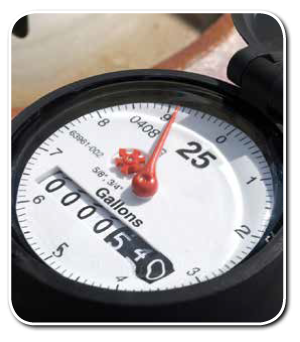Water Meters

Water metering is the process of measuring water use. Water meters use mechanical, magnetic or electronic devices to measure the amount of water being used. An effective metering program allows us to compare measured flows in our systems and metered deliveries to our customers. Residential and commercial water meters are generally owned, read and maintained by the public water provider. Water meters are read regularly and you receive a bill based the amount of water used since the meter was last read. Meters are most often made of bronze or brass and plastic, and are often located in front of your property, inside a concrete or plastic meter box that is set flush with the ground. Water meters not only help utilities collect the revenue they are due, they also help pinpoint leaks, locate pressure problems along their waterways, and identify and study periods of peak and non-peak use among both residential and business consumers.
METER MAINTENANCE PROGRAMS
All CRWP members are required to have Meter Maintenance Programs which facilitate regular calibration and/or replacement of water meters to ensure accuracy. Water meters tend to deteriorate with age, resulting in inaccurate readings. Old meters are often damaged or do not record water use at all. Inaccurate readings result in inaccurate information about water usage which impacts system audits and leak detection efforts. Meter maintenance programs are designed to test all system meters at regular intervals. This is to ascertain that meters are appropriately sized, and to ensure meters are working properly. In addition, it identifies meters that should be replaced or repaired. Accounting for all water is a number one priority or our water utilities.
DID YOU KNOW?
You can use your water meter to check for household leaks.
Click here for more information.
![]()
Conservation Rebates
![]()
Conservation Tools
![]()
Demonstration Garden
![]()
Indoor Conservation
![]()
Outdoor Conservation
![]()
